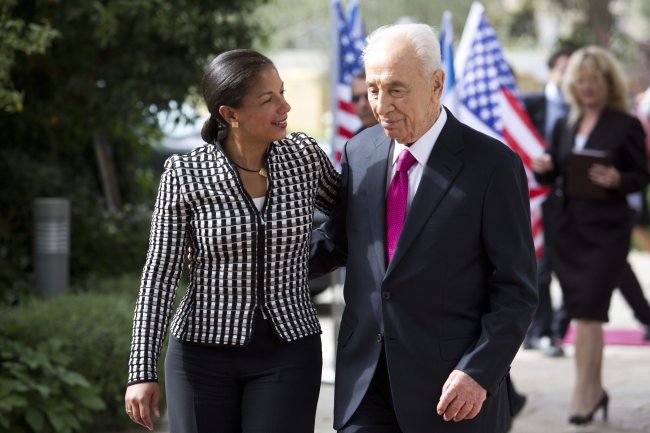Obama aide urges Israeli leaders to continue Mideast peace talks
By Korea HeraldPublished : May 8, 2014 - 21:10
JERUSALEM (AP) ― U.S. President Barack Obama’s national security adviser opened a visit to Israel by telling leaders Wednesday that peace with the Palestinians can only be reached through direct negotiations leading to the establishment of an independent Palestinian state.
Susan Rice delivered her message days after the latest round of U.S.-backed peace talks ended in failure. It remains unclear whether talks will resume, and both sides have threatened to take unilateral action against one another.
The former chief prosecutor of the International Criminal Court, in Israel on a separate visit, also urged the Palestinians to proceed with caution as they consider pursuing war crimes charges against Israel. He said it would be preferable to work out their differences directly.
Rice, in Israel for strategic talks with Israel, is the first senior American official to visit Israel since nine months of U.S.-brokered talks fizzled out late last month. No progress was made during the talks, and Israel and the Palestinians have been blaming each other for the breakdown.
Susan Rice delivered her message days after the latest round of U.S.-backed peace talks ended in failure. It remains unclear whether talks will resume, and both sides have threatened to take unilateral action against one another.
The former chief prosecutor of the International Criminal Court, in Israel on a separate visit, also urged the Palestinians to proceed with caution as they consider pursuing war crimes charges against Israel. He said it would be preferable to work out their differences directly.
Rice, in Israel for strategic talks with Israel, is the first senior American official to visit Israel since nine months of U.S.-brokered talks fizzled out late last month. No progress was made during the talks, and Israel and the Palestinians have been blaming each other for the breakdown.

Rice told Israeli Prime Minister Benjamin Netanyahu that while negotiations have hit a pause, the U.S. “remains convinced that lasting peace can only be secured through direct negotiations that lead to two viable, independent states living side by side in peace and security,” according to a statement released by the White House.
Rice also met outgoing Israeli President Shimon Peres and said Peres would visit the White House on June 25.
The final weeks of the peace talks fell apart in the wake of a series of one-sided moves by both sides.
Israel failed to carry out a promised release of Palestinian prisoners and approved construction of hundreds of new homes in Israeli settlements.
The Palestinians responded by resuming a campaign for international recognition for the “state of Palestine.” Palestinian President Mahmoud Abbas then announced a reconciliation deal with the rival Hamas movement, an Islamic militant group that Israel and the U.S. consider a terrorist organization.
With the end of talks, Israeli leaders have threatened to take further action against the Palestinians, ranging from potential financial sanctions to the possible annexation of parts of the West Bank. Some Palestinians, meanwhile, have said they should push forward with their campaign for international recognition.
The Palestinians were accepted as a nonmember state in the U.N. General Assembly in 2012, an upgraded status that allows them to qualify for membership in dozens of international conventions and agencies.
Most worrisome for Israel is the Palestinian threat to join the International Criminal Court and pressing war crimes charges against Israel. The Palestinians allege that Israeli crimes range from actions carried out by its military to construction of Jewish settlements on occupied land captured in the 1967 Mideast war.
-
Articles by Korea Herald








![[KH Explains] Hyundai's full hybrid edge to pay off amid slow transition to pure EVs](http://res.heraldm.com/phpwas/restmb_idxmake.php?idx=644&simg=/content/image/2024/04/18/20240418050645_0.jpg&u=20240419100350)







![[From the Scene] Monks, Buddhists hail return of remains of Buddhas](http://res.heraldm.com/phpwas/restmb_idxmake.php?idx=652&simg=/content/image/2024/04/19/20240419050617_0.jpg&u=20240419175937)

![[KH Explains] Hyundai's full hybrid edge to pay off amid slow transition to pure EVs](http://res.heraldm.com/phpwas/restmb_idxmake.php?idx=652&simg=/content/image/2024/04/18/20240418050645_0.jpg&u=20240419100350)

![[Today’s K-pop] Illit drops debut single remix](http://res.heraldm.com/phpwas/restmb_idxmake.php?idx=642&simg=/content/image/2024/04/19/20240419050612_0.jpg&u=)